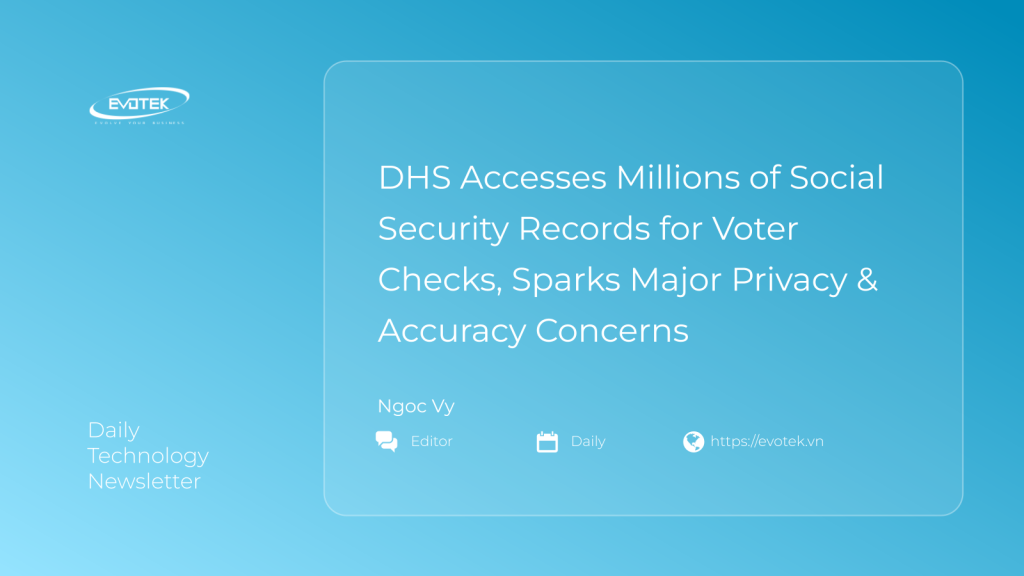The Department of Homeland Security (DHS) has recently secured expanded access to hundreds of millions of Americans’ Social Security data. This new agreement, intended to bolster voter citizenship checks, is raising serious alarms among experts due to its remarkably sparse provisions for data accuracy and privacy. Critics warn of significant risks, including potential errors that could disenfranchise eligible voters and the broader misuse of sensitive personal information.
This initiative is part of the Trump administration’s overarching strategy to consolidate federal data, aiming to tighten immigration enforcement and identify instances of non-citizen voting.
The SAVE System’s Expanded Role
Previously, the Systematic Alien Verification for Entitlements (SAVE) system was primarily used by state and local officials to verify immigrant status for benefit applications, utilizing information only from individuals with prior contact with DHS, such as those with permanent resident status.
A pivotal shift occurred this year with a data-sharing agreement signed on May 15. This agreement enabled DHS to integrate confidential data from the Social Security Administration (SSA), including full Social Security Numbers (SSNs), into the SAVE system. This enhancement allows SAVE to perform bulk searches using SSNs for the first time, dramatically expanding its capability for voter citizenship verification.
Despite President Donald Trump’s assertions regarding widespread non-citizen voting, initial outcomes from states utilizing the enhanced SAVE system have been limited. For example, Texas identified only 2,724 “potential noncitizens” out of 18 million registered voters (approximately 0.015%). Louisiana reported similar figures, finding 390 among 2.8 million registered voters (around 0.014%).
Mounting Privacy and Accuracy Concerns
Legal and privacy experts who have examined the agreement are deeply concerned. They point to the alarming lack of robust safeguards to ensure data accuracy and minimal details on how this extensive dataset will be secured. A key concern is that the agreement does not explicitly prohibit DHS from deploying SSA data for other purposes, including broader immigration enforcement, intensifying fears of data exploitation. These worries align with past criticisms of the Trump administration’s efforts to pool other sensitive federal information, such as tax data.
The consolidated dataset within SAVE now combines SSNs, addresses, birth dates, criminal records, and immigration histories for millions of Americans previously not in DHS databases. While this could potentially assist in mass voter citizenship verification, experts caution against using SAVE as the sole basis for determining non-citizenship. Multiple audits and analyses have consistently demonstrated that SSA citizenship information can be outdated or incomplete, particularly for naturalized citizens.
Legal Challenges and Expert Warnings
Caren Short, director of legal and research for the League of Women Voters of the United States, voiced strong apprehension, stating, “The Trump administration is hunting people to try to purge people from the rolls who are lawfully registered, and they are doing it by looking at unreliable, outdated data.” With the 2026 midterms less than a year away, the potential for legitimate voters to be erroneously disenfranchised is a significant worry.
Several privacy lawyers contend that DHS’s expansion of SAVE may be unlawful, arguing that it bypasses federal legal requirements, such as issuing a system of records notice to inform the public about how the additional data will be collected, stored, and used. Advocacy groups have already initiated lawsuits against the federal government, alleging that these data consolidation efforts violate the Privacy Act.
Federal officials, in response, have cited the Illegal Immigration Reform and Immigrant Responsibility Act of 1996 as justification for information sharing to verify citizenship status, while promising caution in identifying non-citizens. However, Leland Dudek, who served as acting SSA commissioner until early May, expressed skepticism, predicting “massive mistakes” as officials attempt to cross-match data from various systems.
State Participation and Future Implications
Concurrently, the Justice Department has been actively seeking access to state voter registration lists for compliance with federal voter roll maintenance laws, filing lawsuits against states that have resisted. Interestingly, some states that have declined to share voter data directly with the Justice Department have instead entered into agreements with DHS to upload this same information into the SAVE system.
According to a document obtained by the ACLU, which sued the administration for SAVE-related records, a growing number of states are signing agreements with DHS to use SAVE to vet voter rolls. As of July, ten additional states had signed on, joining the initial ten that were already participating in 2025. Naomi Gilens, counsel for Protect Democracy, a non-profit voting rights group, underscored the broader implications for Americans, saying, “That is a very invasive picture that starts to be painted, in one place, for every individual who lives here’s private lives.”
Homeland Security officials have already processed more than 33 million voters through SAVE. Initial results, detailed in an ACLU-obtained document from late August, indicate the following:
- Approximately 96.3% of voters checked were identified as U.S. citizens.
- For an additional 3.1% of voters, the system either couldn’t find them or needed more information to determine their citizenship status.
- About 0.5% of voters checked were found to be deceased.
- Only 0.04% appeared as noncitizens.
State agreements with DHS mandate additional verification steps for any voter flagged as non-citizen by the SAVE system, requiring election officials to contact registrants to obtain proof of citizenship. However, concerns persist among experts like Dudek and Kathleen Romig, a former Social Security official, regarding potential mismatches. These could arise from common names, misspellings, or the use of partial Social Security Numbers by states. Romig warned, “If there’s Jane Smith that is a citizen, and a Jane Smith that isn’t, you don’t want to disenfranchise the citizen Jane Smith by accident.”
The expansion of SAVE is far from complete. According to a recent USCIS presentation to election officials, the next phase involves integrating passport information from the State Department, further consolidating sensitive personal data into the system.

 日本語
日本語 한국어
한국어 Tiếng Việt
Tiếng Việt 简体中文
简体中文